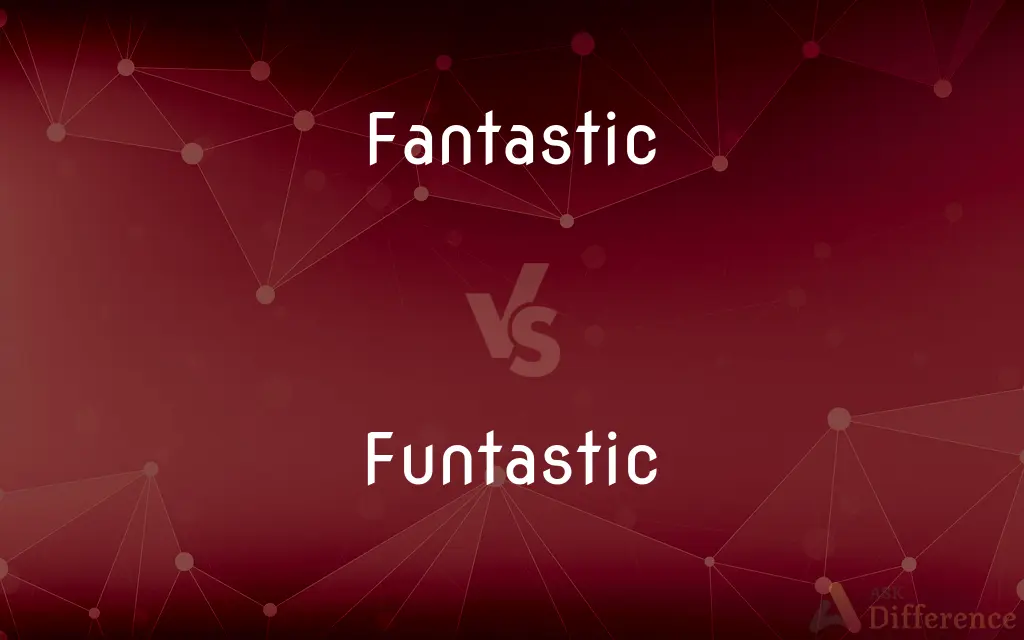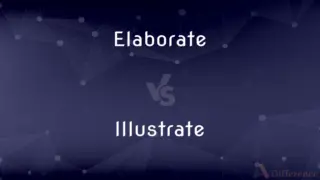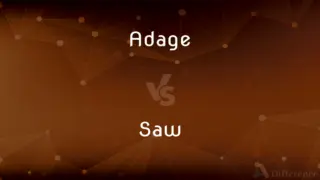Fantastic vs. Funtastic — What's the Difference?
Edited by Tayyaba Rehman — By Maham Liaqat — Updated on March 24, 2024
Toxication is the process of becoming poisoned, while intoxication generally refers to impairment caused by substances, often alcohol.

Difference Between Fantastic and Funtastic
Table of Contents
ADVERTISEMENT
Key Differences
Toxication specifically refers to the process or act of being poisoned by toxins or chemicals, emphasizing the harmful effects on the body. In contrast, intoxication is more commonly associated with the state of being under the influence of alcohol or drugs, leading to impaired physical and mental faculties.
While both terms imply the presence of substances in the body that can cause harm or alteration of normal functioning, toxication is used more in contexts of poisoning and toxicology, focusing on the adverse effects of various substances. Intoxication, however, encompasses a broader range of effects, including those induced by recreational drugs and alcohol, and can range from mild impairment to severe poisoning.
Toxication is primarily used in scientific and medical contexts to describe the detrimental effects of substances on biological systems. Intoxication, while also used in medical contexts, is more widely recognized in legal and social settings, particularly relating to alcohol consumption and its societal impacts.
The distinction between the two terms can also be seen in their etymology and usage over time. "Toxication" derives directly from the notion of "toxic," indicating the presence and impact of toxins. "Intoxication" has a broader historical usage, including its legal implications in cases of alcohol and drug use.
In practical terms, toxication often requires medical treatment and intervention to address the poisoning effects of substances, ranging from mild to life-threatening. Intoxication, especially when related to alcohol or drug use, might also require medical attention, but it is frequently addressed within the context of social, legal, and personal behavior management.
ADVERTISEMENT
Comparison Chart
Definition
The process of being poisoned by substances
The state of being impaired by alcohol or drugs
Context
Scientific, medical
Medical, legal, social
Focus
Harmful effects, poisoning
Impairment, effects of alcohol or drugs
Usage
More specific to poisoning
Broader, including recreational use
Treatment
Medical intervention for poisoning
May require medical attention or behavioral management
Compare with Definitions
Fantastic
The study of the harmful impacts of chemicals.
His research focuses on toxication in aquatic life.
Funtastic
Impairment due to alcohol or drugs.
Intoxication led to impaired judgment and coordination.
Fantastic
Exposure to and the impact of poisons.
Toxication by lead paint remains a concern in older homes.
Funtastic
The state of being under the influence of substances.
The driver was arrested for intoxication.
Fantastic
The adverse effects of toxic substances on an organism.
Symptoms of toxication can include nausea and dizziness.
Funtastic
Psychological and physical effects of drugs or alcohol.
Symptoms of intoxication include slurred speech.
Fantastic
The process by which toxic substances cause harm.
Toxication affects the liver's ability to function properly.
Funtastic
Social and behavioral impact of substance use.
The party was marred by widespread intoxication.
Fantastic
Becoming poisoned by chemicals or toxins.
The factory spill led to the toxication of nearby water sources.
Funtastic
(nonstandard) Fantastically]] fun.
But mom! Can't I go to the fair? The others say it will be funtastic!
Fantastic
The fantastic (French: le fantastique) is a subgenre of literary works characterized by the ambiguous presentation of seemingly supernatural forces. Bulgarian-French structuralist literary critic Tzvetan Todorov originated the concept, characterizing the fantastic as the hesitation of characters and readers when presented with questions about reality.
Fantastic
Based on or existing only in fantasy; unreal
Fantastic mythological creatures.
The fantastic realms of science fiction.
Fantastic
Strange or fanciful in form, conception, or appearance
“The fire assumed fantastic shapes as he watched” (Ward Just).
Fantastic
Unrealistic; irrational
“the early jubilant years of the Restoration with their fantastic hopes of a Golden Age and incorruptible power” (Janet Todd).
Fantastic
Exceedingly great in size or degree; extravagant
A fantastic sum of money.
Fantastic
Wonderful or superb; remarkable
A fantastic trip to Europe.
Fantastic
An eccentric person.
Fantastic
Existing in or constructed from fantasy; of or relating to fantasy; fanciful.
He told fantastic stories of dragons and goblins.
His fantastic post-college plans had all collapsed within a year of graduation.
She had a fantastic view of her own importance that none of her colleagues shared.
Fantastic
Not believable; implausible; seemingly only possible in fantasy.
The events were so fantastic that only the tabloids were willing to print them.
She entered the lab and stood gaping for a good ten minutes at the fantastic machinery at work all around her.
Fantastic
Resembling fantasies in irregularity, caprice, or eccentricity; irregular; grotesque.
Fantastic
Wonderful; marvelous; excellent; extraordinarily good or great (used especially as an intensifier).
"I had a simply fantastic vacation, and I can't wait to tell you all about it!"
Fantastic
(archaic) A fanciful or whimsical person.
Fantastic
Existing only in imagination; fanciful; imaginary; not real; chimerical.
Fantastic
Having the nature of a phantom; unreal.
Fantastic
Indulging the vagaries of imagination; whimsical; full of absurd fancies; capricious; as, fantastic minds; a fantastic mistress.
Fantastic
Resembling fantasies in irregularity, caprice, or eccentricity; irregular; oddly shaped; grotesque.
There at the foot of yonder nodding beech,That wreathes its old fantastic roots so high.
Fantastic
A person given to fantastic dress, manners, etc.; an eccentric person; a fop.
Our fantastics, who, having a fine watch, take all ocasions to draw it out to be seen.
Fantastic
Ludicrously odd;
Hamlet's assumed antic disposition
Fantastic Halloween costumes
A grotesque reflection in the mirror
Fantastic
Extraordinarily good; used especially as intensifiers;
A fantastic trip to the Orient
The film was fantastic!
A howling success
A marvelous collection of rare books
Had a rattling conversation about politics
A tremendous achievement
Fantastic
Extravagantly fanciful and unrealistic; foolish;
A fantastic idea of his own importance
Fantastic
Existing in fancy only;
Fantastic figures with bulbous heads the circumference of a bushel
Fantastic
Exceedingly or unbelievably great;
The bomb did fantastic damage
Samson is supposed to have had fantastic strength
Phenomenal feats of memory
Common Curiosities
Can intoxication be considered a form of toxication?
In a broad sense, yes, since intoxication by alcohol or drugs involves the harmful effects of these substances, but intoxication carries broader social and legal implications.
How is intoxication different from toxication?
Intoxication refers to the state of being under the influence of alcohol or drugs, leading to impaired faculties, whereas toxication refers specifically to poisoning.
What role does toxicology play in understanding toxication?
Toxicology is the scientific study of the effects of toxins and poisons, playing a crucial role in diagnosing, treating, and preventing toxication.
Is intoxication always illegal?
Not always; the legality of intoxication depends on the substance, the individual's age, behavior while intoxicated, and local laws.
What are common symptoms of toxication?
Symptoms can include nausea, dizziness, difficulty breathing, and impaired organ function, depending on the toxin.
What treatments are available for toxication?
Treatments vary widely but can include antidotes, supportive care, detoxification processes, and avoiding further exposure to the toxin.
What is toxication?
Toxication is the process or act of becoming poisoned by chemicals or toxins, leading to harmful effects on the body.
Can toxication be accidental?
Yes, toxication can occur accidentally, through exposure to environmental toxins, contaminated food or water, or mishandling of chemicals.
How is intoxication treated?
Treatment can range from monitoring and supportive care to specific interventions for alcohol poisoning or drug overdoses.
Can one recover from toxication?
Recovery depends on the severity of the poisoning, the toxin involved, and the timeliness of treatment, ranging from full recovery to long-term health impacts.
Share Your Discovery

Previous Comparison
Elaborate vs. Illustrate
Next Comparison
Adage vs. SawAuthor Spotlight
Written by
Maham LiaqatEdited by
Tayyaba RehmanTayyaba Rehman is a distinguished writer, currently serving as a primary contributor to askdifference.com. As a researcher in semantics and etymology, Tayyaba's passion for the complexity of languages and their distinctions has found a perfect home on the platform. Tayyaba delves into the intricacies of language, distinguishing between commonly confused words and phrases, thereby providing clarity for readers worldwide.















































